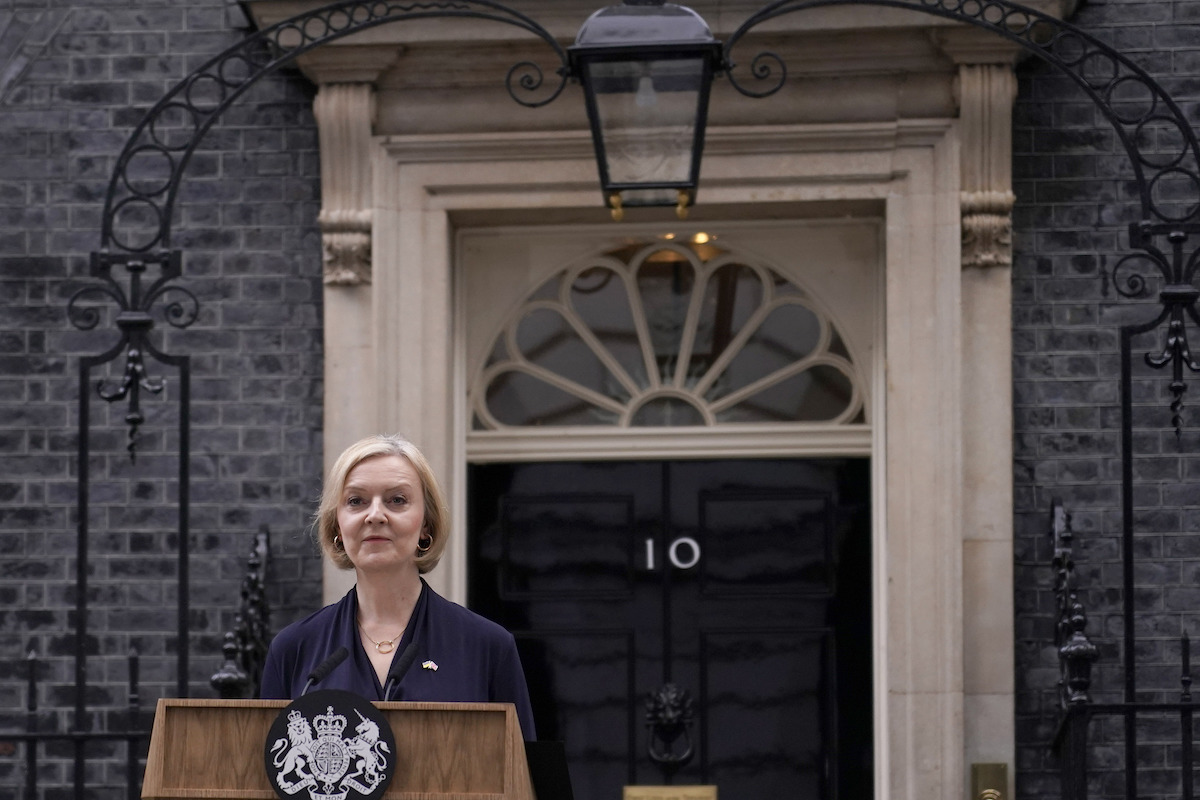Boris Johnson, though deeply flawed, was the glue that held the British Conservative Party together. His electoral reach, charisma, and commitment to deliver Brexit put together a huge majority of 80 seats over all other parties combined in the 650-seat House of Commons.
But that glue came unstuck owing to Boris’ character flaws, and now, in the resulting chaos, the Conservative Party itself has come apart at the seams, squandering the largest parliamentary majority in recent times. Cabinet ministers fell like stones, Members of Parliament demanded the reversal of the vote of the membership, the prime minister herself changed policy on issues by the day, by the hour.
Unable to either command her party or deliver on her electoral mandate, Liz Truss resigned on October 20, after just 45 days in office, the shortest premiership in British history.
The consequences, however, are profound. The coalition that Boris Johnson built had three major elements. First, there were the Thatcherite low-tax, small-state conservatives. Second, there were socially conservative, anti-immigration Brexit voters, who in certain parts of the country had traditionally voted Labour but flocked to the Boris Johnson banner. There is some overlap, but it is, as we will see, by no means universal. Both these groups were minorities; together, however, they formed a majority, albeit an unstable one. The third group consisted of those Conservatives who just wanted to win and recognized Boris Johnson’s electoral appeal. Many big-government big spenders were hidden within this last group. What is even more bizarre is that Boris himself appeared to belong to neither of those first two groups at all, just the third one—he wanted to win and, despite some innate instincts for liberty, too often saw government as the answer rather than part of the problem.
Both of the two main parts of the coalition that is the Conservative Party have been blown out of the water and consigned to the trash can for the foreseeable future. They have been replaced by economic globalists and advocates of big government. This is the disastrous consequence of electing the inept and failing to argue, and win, the case. The party elected the least-disliked candidate in Liz Truss from a motley collection. The membership made clear, at least in polling, that they wanted Kemi Badenoch, who combined those first two groups of party constituents. The Members of Parliament, however, wanted Rishi Sunak, the chancellor (equivalent to treasury secretary), who was more of an economic globalist. Both ended up with their second choice—the MPs explicitly, the members because they were not even offered their preferred option. And there were serious doubts about the basic capability of the successful candidate.
Liz Truss represented, at least in part, that first group: low tax, small state, but not the second, the socially conservative and anti-immigration voters. What is more, she proved a poor advocate even of the first group.
Let’s deal first with that second group. According to the BBC, nearly 34,000 illegal immigrants have crossed the English Channel from France so far in 2022. Every one of them goes onto the state welfare budget. Suella Braverman, appointed home (interior) secretary by Liz Truss, resigned on October 19 after a blazing row with the prime minister, who wished, for economic reasons, to further relax restrictions on immigration. That second group of voters, who delivered so many new districts for the Conservatives, won’t be doing so a second time.
Surely, though, we could at least place some hope in the low-tax, small-state agenda? The so-called mini-budget, a little over two weeks after Liz Truss took up office, contained some seriously hopeful agenda items. These included canceling a proposed rise in corporate tax; reversing a previously imposed tax rise on both employees and employers; reducing from next April the standard rate of income tax from 20% to 19%; abolishing the highest rate income tax band (45%) altogether; removing the cap on bonus payments in the banking sector; and supply-side reforms such as building even more low-tax investment zones, reducing regulation on entrepreneurs, and planning zone freedoms (intended to reduce regulations to make it easier to build new houses). Phew! Great stuff. Polling showed that, apart from bankers’ bonuses and the 45% rate abolition, the measures all had public support.
Why, then, did they fail so spectacularly and in a way that exposed Prime Minister Truss as so weak, effectively forcing her resignation?
Janet Daly, an American-born, sensible, and competent columnist for the Daily Telegraph, wrote that nobody “is being truthful about the depth and breadth of this crisis which is common to all the Western nations who have been perpetrating an economic lie since 2008.” In other words, we have become addicted to cheap money and big government, and the two are connected. This was one of the consequences of both the economic crisis of 2008 onward and the COVID catastrophe. Governments bailed out business with cheap (low-interest) money. And since money is made “cheap” for a reason, more can (and will) always be borrowed. It’s a vicious circle of spending and debt that bursts when interest rates return to more normal levels. With COVID, the government will restrict liberty and, once again, bail out business from the fallout. The principal consequence is that a high-tax, high-spend government paradigm is now baked in for the foreseeable future,irrespective of which party runs the government.
A program of reform needs planning and careful execution. Even more important, however, is to make the case and win the argument. We simply cannot assume that people understand the basic principles that make a moral case for a low-tax, small-state economy. In this instance, the pro-growth argument was not even attempted, simply announced. The markets were ready for part of the agenda but not the speed and, also, not the inherent contradiction at the heart of the program. Economic growth! preached the prime minister. Lower taxes, encourage investment, economic freedom! Oh, and continued government spending at the highest levels in living memory. It is that contradiction of low tax but high spend and high borrowing that sank the budget proposals. The PM was too weak and the Conservative Party too addicted to cheap money for the plan to work.
The media bayed and the markets tanked. The pound dropped, worried, of course, by debt, and interest rates on government bonds rose sharply, exposing also a number of fallacies in the market itself—overreliance on bonds and opportunities to short the currency to make a profit. In the wake of this chaos, the chancellor resigned, and his successor (who gained so few votes even among Members of Parliament in the leadership election that he was eliminated in the first round) reversed nearly everything. Markets, of course, are fickle and should be careful what they wish for. Low tax wedded to low debt has been abandoned. A Labour government is unlikely to operate with lower levels of government debt. The market should, perhaps, have been more cautious in its response.
Needless to say, the media loved it. They helped bring Boris down (with assistance from the man himself), and they hate anything related to Brexit and populism and, indeed, anything remotely conservative. Another opportunity to bring down a government. They now have succeeded. Every day, the media complained about “unfunded tax cuts.” There is no such thing; there is only unfunded government expenditures, the solution to which is either to borrow more (so our children pay), to tax more, or to spend less. Alas, this last option was never on offer from Liz Truss. You see the contradictions. Never once did the media cry out that the British tax burden is the highest for 70 years and that government expenditure was at unsustainable levels.
The current debacle had thus ended in the only way that was ever possible. The outcome will be, undoubtedly, that one of the losers is installed. The coalition of the Conservative Party is broken. Since the Second World War, there have been approximately 29 years of Labour governments, and 42 years of Conservative government. We are probably headed for a leftist government. Oh well, one leftist government under the Labour banner replacing another leftist government under the Conservative banner. The biggest loss is that intellectual vision for small-state conservatism. We will need to return to the drawing board and make the basic moral arguments again. As no small aside, Scripture reminds us that government should be limited in its reach (Deut 17:14-20).
What happens now? As we understand it, within a week there will be a leadership election. Will the membership be asked their views? Apparently so, but the bar for nominations will be set so high among MPs (most likely 100 nominations to stand, last time it was 20) that there will likely be a maximum of three candidates even in the first round. Perhaps there will be online membership voting or, even more likely, there will remain but one candidate standing, so the membership will not be asked at all. There is talk of Boris returning, but surely that has to be unrealistic, and certainly not wise. Lord, help us.
A final point. I genuinely feel sorry for Liz Truss. One potential candidate at the time of the Conservative leadership election declined to stand because of the impact on his family. Politics is brutal; I would say too brutal. It is almost impossible to make the intellectual arguments necessary for specific policies because you are immediately classified as either partisans or traitors. Liz Truss has two teenage daughters. Pray for her and her family at this difficult time. Our leaders need our prayers always; indeed, as Christians we are enjoined by Scripture not only to submit to our leaders (Rom 13: 1-7; Pet 2:13-25) but also to pray for them, irrespective of whether we voted for them or agree with them (1 Tim 2:1-2). Government is a godly institution for our good and well-being. Pray for those in government, pray for those called to serve. Pray that the Lord will raise up new and godly leaders. Pray for our nation-states.

